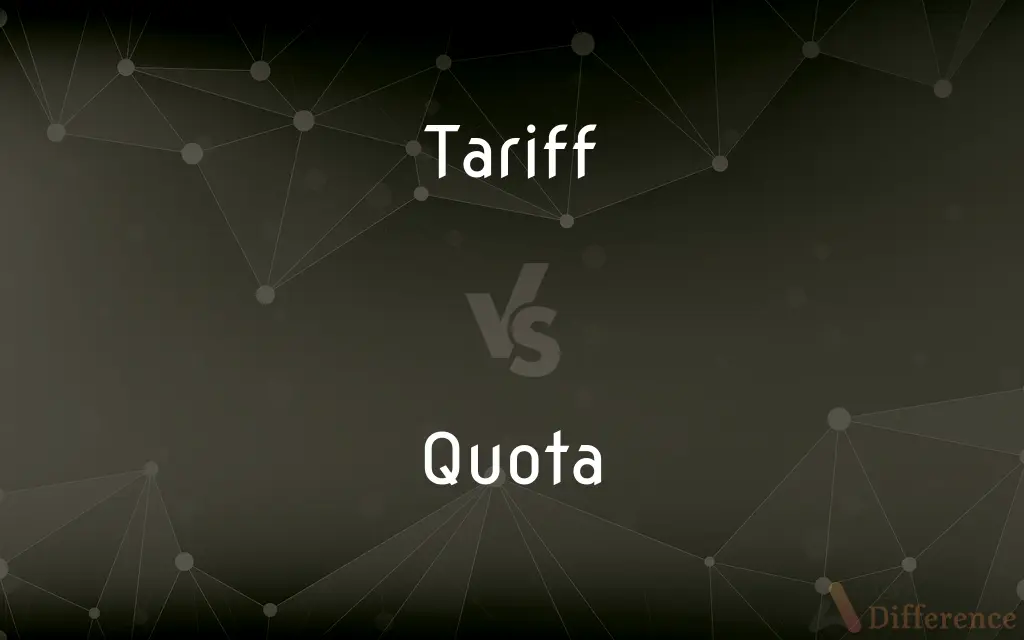Tariff vs. Quota — What's the Difference?
By Tayyaba Rehman — Updated on October 5, 2023
Tariff is a tax on imported goods, while a quota sets limits on production, export, or import of a product.

Difference Between Tariff and Quota
Table of Contents
ADVERTISEMENT
Key Differences
A tariff is essentially a tax that is levied on imports, directly affecting the pricing of foreign goods. Unlike a tariff, a quota limits the volume of goods that can be imported, without necessarily directly impacting price.
Tariffs are generally employed to protect domestic industries by increasing the cost of imported goods. Quotas, while also protective, restrict international trade by limiting the quantity of goods imported into a country.
Revenue is generated for a government through the imposition of tariffs, as they add to the cost of imported goods. Quotas do not generate revenue in the same way, instead, they control volume and may indirectly impact domestic pricing.
The primary purpose of a tariff is often to stabilize domestic prices and protect local industries from international competition. The essence of a quota, however, is to safeguard specific industries by regulating the influx of foreign goods.
Tariffs and quotas, although different in mechanics, are instruments that can be used to implement protectionist policies in international trade. They serve to manage and control the flow and pricing of foreign goods into a domestic market.
ADVERTISEMENT
Comparison Chart
Definition
A tax imposed on imported goods.
A limited quantity of a product allowed to be imported or produced.
Purpose
To protect domestic industries by raising prices of imports.
To regulate and control volume of specific imports.
Revenue Generation
Generates revenue for the governing authority.
Does not directly generate government revenue.
Impact on Prices
Directly increases the price of imported items.
May indirectly increase prices of imported goods by limiting supply.
Implementation
Applied through tax codes and customs regulations.
Enforced through trade regulations and penalties.
Compare with Definitions
Tariff
A list of prices for services or goods.
The hotel’s tariff for a suite is listed on its website.
Quota
A fixed share of something that a person or group is entitled to achieve or contribute.
She met her sales quota for the month.
Tariff
The scale of charges for public services.
The electricity tariff went up due to increased production costs.
Quota
A restriction on the action or use of a product or resource.
The organization implemented a quota on paper use to encourage recycling.
Tariff
To charge (someone) with a list of prices for services.
The hotel will tariff guests for additional amenities.
Quota
An official allocation of resources or tasks.
The manager assigned a quota for each team member.
Tariff
A tariff is a tax imposed by a government of a country or of a supranational union on imports or exports of goods. Besides being a source of revenue for the government, import duties can also be a form of regulation of foreign trade and policy that taxes foreign products to encourage or safeguard domestic industry.
Quota
A proportional share, as of goods, assigned to a group or to each member of a group; an allotment.
Tariff
A list or system of duties imposed by a government on imported or exported goods.
Quota
A production assignment.
Tariff
A duty or duties so imposed.
Quota
A number or percentage, especially of people, constituting or designated as an upper limit
A country with strict annual immigration quotas.
Tariff
A schedule of prices or fees.
Quota
A number or percentage, especially of people, constituting a required or targeted minimum
A system of quotas for hiring minority applicants.
Tariff
To fix a duty or price on.
Quota
A proportional part or share; the share or proportion assigned to each in a division.
Tariff
A system of government-imposed duties levied on imported or exported goods; a list of such duties, or the duties themselves.
Quota
A prescribed number or percentage that may serve as, for example, a maximum, a minimum, or a goal.
Tariff
A schedule of rates, fees or prices.
Quota
A restriction on the import of something to a specific quantity.
Tariff
(British) A sentence determined according to a scale of standard penalties for certain categories of crime.
Quota
A proportional part or share; the share or proportion assigned to each in a division.
Tariff
(transitive) to levy a duty on (something)
Quota
A share of effort required to be performed, or a share of resources required to be contributed to some common purpose.
Tariff
A schedule, system, or scheme of duties imposed by the government of a country upon goods imported or exported; as, a revenue tariff; a protective tariff; Clay's compromise tariff. (U. S. 1833).
Quota
A prescribed number;
All the salesmen met their quota for the month
Tariff
The duty, or rate of duty, so imposed; as, the tariff on wool; a tariff of two cents a pound.
Quota
A proportional share assigned to each participant
Tariff
Any schedule or system of rates, changes, etc.; as, a tariff of fees, or of railroad fares.
Quota
A limitation on imports;
The quota for Japanese imports was negotiated
Tariff
To make a list of duties on, as goods.
Quota
A limited quantity of a product that may be produced, exported, or imported.
The country set a quota for corn imports.
Tariff
A government tax on imports or exports;
They signed a treaty to lower duties on trade between their countries
Quota
A proportional share assigned to a person or group.
The region has a fishing quota to protect local species.
Tariff
Charge a tariff;
Tariff imported goods
Tariff
A tax or duty to be paid on particular imports or exports.
The country imposed a new tariff on luxury cars.
Tariff
A system of charging according to a fixed rate.
The shipping company operates based on a weight-related tariff.
Common Curiosities
Can tariffs affect consumer prices?
Yes, tariffs can increase consumer prices by adding to the cost of imported goods.
How do quotas affect trade?
Quotas restrict the volume of trade by limiting the amount of goods that can be imported or produced.
Why are tariffs implemented?
Tariffs are implemented to protect domestic industries by raising the price of imported goods.
What is a tariff?
A tariff is a tax imposed on imported goods.
Can a quota be changed?
Yes, quotas can be adjusted based on economic conditions, political decisions, and trade agreements.
How are quotas monitored?
Quotas are monitored through trade data tracking, regulatory bodies, and international agreements.
How are tariffs enforced?
Tariffs are enforced at border crossings through customs agencies.
In what scenarios are quotas typically used?
Quotas are used to protect specific industries by limiting imports, such as agriculture or manufacturing.
How is a quota defined?
A quota is a limit on the amount of certain products that can be imported or produced.
Are tariffs always in monetary form?
Yes, tariffs are typically monetary and are added to the cost of the imported goods.
What is a protective tariff?
A protective tariff is designed specifically to shield domestic industries from foreign competition.
Who sets quotas?
Quotas are generally set by government bodies or international trade organizations.
Can tariffs and quotas be used together?
Yes, tariffs and quotas can be used in tandem to manage and control import and export dynamics.
Do quotas encourage domestic production?
Yes, quotas can encourage domestic production by limiting foreign competition.
Can tariffs target specific countries?
Yes, tariffs can be implemented to target specific countries or regions.
Share Your Discovery

Previous Comparison
Imitation vs. Modeling
Next Comparison
In vs. IntoAuthor Spotlight
Written by
Tayyaba RehmanTayyaba Rehman is a distinguished writer, currently serving as a primary contributor to askdifference.com. As a researcher in semantics and etymology, Tayyaba's passion for the complexity of languages and their distinctions has found a perfect home on the platform. Tayyaba delves into the intricacies of language, distinguishing between commonly confused words and phrases, thereby providing clarity for readers worldwide.
















































